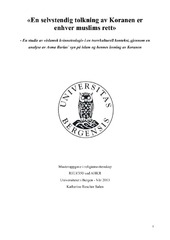| dc.contributor.author | Salen, Katherine Roscher | eng |
| dc.date.accessioned | 2013-08-20T13:01:19Z | |
| dc.date.available | 2013-08-20T13:01:19Z | |
| dc.date.issued | 2013-05-15 | eng |
| dc.date.submitted | 2013-05-15 | eng |
| dc.identifier.uri | https://hdl.handle.net/1956/6976 | |
| dc.description.abstract | This paper explores Asma Barlas`s understanding of islam and her interpretation of the Qur`an. I have situated her in the field of what I call islamic female theology" as part of the islamic reform- movement and in the context of the american academic tradition. Barlas is a Pakistani national but has lived in the USA for almost half her life. Her work tries to establish the Qur`an as an anti- patriarchal and egalitarian text. Barlas main concern is not with the Qur`an teachings; rather she argues that the reason for female oppression stems from the secondary islamic sources: the ahadith and tafsir and in realition to this the shari`a and fiqh. I argue that Barlas is using the islamic legal principle of ijtihad (refers to the process of independent reasoning) as a doorway and starting point for a legitimate new reading of the Qur`an. Her means to interpret the Text build on the well known islamic scholar Fazlur Rahman`s work, i.e. his critique of the secondary islamic texts and his two- fold movement theory: to read the Qur`an in light of its historical context. On one hand this takes the socio-cultural and ethico- cultural context of the time of revelation into account, on the other the context of todays society. It is also important to not read the Qur`an piece by piece, according to Barlas. Instead her approach builds on Amina Wadud`s work and her holistic reading of the Text. To achieve a holistic reading of the Qur`an it is important to interpret it in an intratextual way, as emphasized by Barlas. The reason for using both of the above mentioned methods is to be able to separate the universial (relevant for all times and places) verses from the particular (only relevant for certain times and places) ones, and in relation to this: find the universal message of the Qur`an`s teachings. Barlas applies this method on the verses in the Qur`an that alledgely are oppressive to women. At the same time she always reads them in light of the principle of tawhid (God`s unity). | en_US |
| dc.description.abstract | Denne oppgaven drøfter Asma Barlas` forståelse av islam og hennes fortolkning av Koranen. Jeg har plassert henne innen «islamsk kvinneteologi» som er del av den islamske reformbevegelsen og i kontekst av amerikansk akademia. Barlas er opprinnelig fra Pakistan, men har bodd i USA nesten halve livet. Hennes arbeid søker å vise Koranen som en anti-patriarkalsk og egalitær tekst. Barlas er «Korantro» ettersom hun ser Koranen som den eneste autentiske kilde til islam. Hun argumenterer for at kvinneundertrykkelse stammer fra de sekundære islamske kildene: ahadith og tafsir og i forlengelsen av dette: shari`a og fiqh. Jeg argumenterer for at Barlas bruker det islamske rettsprinsippet ijtihad (refererer til prosessen for individuell resonnering) som en innfallsport og diskursivt rom for en ny legitim lesning av Koranen. Hennes metode for tolkning av Koranen bygger videre på den anerkjente islamske lærde Fazlur Rahmans reform-arbeid. Dette gjelder spesielt hans kritikk av de sekundære islamske tekstene og hans «two-fold movement theory»: å lese Koranen i lys av dens historiske kontekst. På den ene siden: de sosio-kulturelle og etiske-kulturelle forholdene som danner konteksten for tiden rundt åpenbaringen, på den andre siden konteksten til nyere samfunn. Videre er det ifølge Barlas viktig at Koranen ikke leses oppstykket. Hun bygger på Amina Waduds arbeid og hennes fokus på en holistisk lesning av Koranen. For å kunne oppnå en holistisk lesning er det viktig at Teksten tolkes intratekstuelt. Formålet med å ta i bruk de nevnte metodene er å kunne skille de generelle/universelle versene (relevant for alle tider alle steder) i Koranen fra de partikulære/spesifikke (bare relevant for spesifikke tider/steder/omstendigheter). Og i relasjon til dette finne det universelle budskapet i Koranens lære. Barlas anvender metodene på, blant annet, de såkalte kvinneundertrykkende versene i Koranen på samme måte som hun alltid leser versene i lys av prinsippet om tawhid (Guds enhet). | en_US |
| dc.format.extent | 745589 bytes | eng |
| dc.format.mimetype | application/pdf | eng |
| dc.language.iso | nob | eng |
| dc.publisher | The University of Bergen | eng |
| dc.subject | Hadith | |
| dc.subject | Koranen | |
| dc.subject | Islam | |
| dc.subject | Kvinnediskriminering | |
| dc.subject | Kjønnsforskning | |
| dc.subject | Asma Barlas | eng |
| dc.subject | Korantolkning | eng |
| dc.subject | Islamsk feminisme | eng |
| dc.subject | Reformbevegelser | eng |
| dc.subject | Ijtihad | eng |
| dc.title | «En selvstendig tolkning av Koranen er enhver muslims rett» - En studie av «islamsk kvinneteologi» i en tverrkulturell kontekst, gjennom en analyse av Asma Barlas` syn på islam og hennes lesning av Koranen | eng |
| dc.type | Master thesis | |
| dc.rights.holder | Copyright the author. All rights reserved | |
| dc.description.degree | Master i Religionsvitenskap | |
| dc.description.localcode | MAHF-RELV | |
| dc.description.localcode | RELV350 | |
| dc.subject.nus | 714999 | eng |
| fs.subjectcode | RELV350 | |
